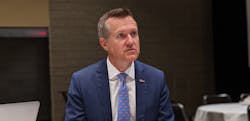ATLANTA — Peterbilt Motors Co. continues to strengthen its market position amid signs that more fleet customers are working to lower the average age of their fleets.
During a press conference at the North American Commercial Vehicle (NACV) Show, General Manager Jason Skoog outlined new safety and efficiency updates for many of Peterbilt's diesel models and provided an update on its battery-electric lineup.
Skoog, who is also a Paccar vice president, expects Peterbilt to end the year with a Class 8 market share approaching 15%. Industrywide sales in the United States and Canada are projected to finish between 310,000 and 320,000 units.
With 2020 appearing to be shaping up “as a solid replacement volume year,” sales will fall to between 230,000 and 260,000 units, said Skoog. Peterbilt’s market share in the medium-duty sector hit 9% last year, and Skoog projected it could reach 12% before too long.
Skoog said feedback from customers earlier this month indicated that more and more are aiming to keep their average fleet age at less than two years, which translates into a trade cycle of four years or less.
In an interview after the press conference, he said that customers believe there are multiple advantages to having a fresher fleet, including that it gives potential driver hires a much "different outlook on first impression.” Beyond recruiting and retention, there are greater fuel efficiency gains and safety technologies with each passing model year, he added.
Skoog was pleased to report Peterbilt has taken 11,000 orders for the 579 UltraLoft sleeper model since being launched in the summer of 2018. About 70% of these are from customers who had previously opted for Peterbilt's traditional sleeper, while the others are ones “Peterbilt has never sold trucks to before.”
In another announcement at NACV, Peterbilt said the Model 579 will come standard with the next generation Bendix Wingman Fusion safety system starting early in 2020. The updated offering incorporates highway departure braking and multi-lane emergency braking to the existing Bendix system.
On the battery-electric truck front, Skoog said Peterbilt will begin distributing pricing and ordering information for its three models in the second quarter of 2020. There are 16 electric Peterbilts already in operation, with 21 more expected to be put into service during the first half of next year.
The Model 579EV, 220EV and 520EV were all on display at Peterbilt’s booth in the exhibit hall. Limited production of these vehicles will begin before next year concludes, Skoog said. As extensive testing of electric trucks continue, he stressed that regardless of powertrain, if there is “a Peterbilt badge on the truck, it needs to perform like a Peterbilt.”
In other announcements at NACV:
Paccar’s 12-speed automated transmission is available for use in vocational applications where the truck spends most of its time on pavement or maintained dirt and gravel roads. The transmission will be available with the Paccar MX-11 or MX-13 engine with up to 510 hp. and 1,850 lbs.-ft. of torque. “The Paccar transmission represents a step change in drivability and performance over previous automated manual transmissions,” said Peterbilt Chief Engineer Scott Newhouse.
Peterbilt will begin to offer over-the-air updates for the Paccar MX engines and aftertreatment systems beginning in December for customers with model year 2017 or newer MX-11 or MX-13 engines and an active SmartLINQ subscription.
The company also introduced a new Platinum Service Center program that scores each dealership location based on key measures. Dealers who make the grade will be recognized at the annual Peterbilt Dealer Meeting in February.
About the Author
Neil Abt
Neil Abt is a former FleetOwner editor who wrote for the publication from 2017 to 2020. He was editorial director from 2018 to 2020.

